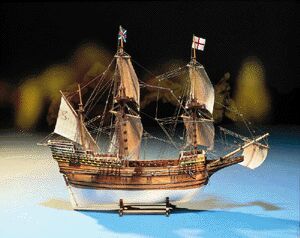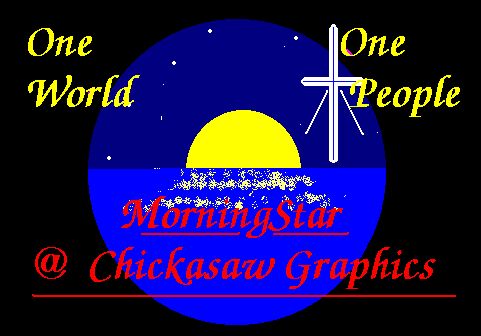| THE SECOND MILLENIA |
| AD 1000 -- AD 2000 |
1600 -- 1700
Trials, Trials, Trials
 The Mayflower
The Mayflower
1600's
| Ancient sport of Sumo wrestling becomes a professional sport in Japan. |
1603
| Queen Elizabeth I of England dies. |
| Sir Walter Raleigh, arrested for suspected complicity in the "Main Plot" which sought to dethrone James I, is tried for high treason and sentenced to imprisonment. (Trial number one.) |
| Heavy outbreak of plague in England. (And more trials.) |
1600
| Kabuki theater begins when Okuni, a female dancer from Isumo Grand Shrine begins to give public performances on an improvised stage set up in the river bed in Kyoto, Japan. |
1604
| King James calls smoking "vile and stinking and dangerous." (Wonder if he accepted any of the money England made off American tobacco crops?) |
1605
| Disease -- small pox, measles, dysentery, typhoid, tuberculosis -- spreads among Native American populations, killing millions. (Even more trials.) |
1606
| Juan de la Cabezade de Altimirano visits St. Augustine, making hin the first bishop to visit North America. |
1607
| With a flourish of trumpets, 105 men under the leadership of Captain Christopher Newport establish the colony of Jamestown at the mouth of the James River on the Virginia coast. |
| Captain James Smith is exonerated of all charges of conspiracy to mutiny and awarded 200 pounds in the first jury trial in America. (Still MORE trials!!) |
1608
| Quebec founded in Canada, first permanent French colony in America. |
1609 -- 1610
| Colonists in Jamestown -- facing harsh winter conditions and barricaded in their fort out of fear of attacks from hostile Native Americans -- starve and are forced to eat dogs, toadstools, and horsehides. (Even more trials!) |
| In his second attempt to locate a passage to China, English navigator Henry Hudson sails his ship, the Half Moon, up the wide-mouthed river near Manhattan Island far enough to determine that the waters do not lead to the Orient. |
1610
| The bagel is invented in Krakow, Poland. Wonder if they had cream cheese! |
| Franciscan claims of success in converting the Indians of New Mexico persuade Mexican officials to maintain their colony there. Pedro de Peralta is named governor of the colony and establishes Santa Fe as its new capital. (First capital city in the New World.) |
1611
| Marco de Dominis publishes scientific explanation of the rainbow. |
1612
| Tobacco is planted in Virginia. (Still wondering about James I?? He was King of England until 1689.) |
"Click Here for the Story of Pocahontas -- the Mother of our Nation"
1616
| William Shakespeare dies, and is buried in Stratford Cemetary. |
"Click Here for the Story of William Shakespeare."
1618
| Sir Walter Raleigh, poet, explorer, scientist, and a once-favored courtier of Queen Elizabeth I, is beheaded at Westminster Palace. He wrote poetry on the eve of his execution. |
1619
| The First African slaves arrive in the land named Virginia. |
1620
| Dutch-born Cornelius Drebbel tests submarine, cruises 15 feet under the Thames River. |
| 149 Pilgrims aboard the Mayflower set sail from Plymouth, England, for the New World. |
1621
| After a winter of deprivation and disease, Pilgrims of Plymouth Colony celebrate their survival at an autumn feast and give thanks to God. This first feast of Thanksgiving celebrated the successful harvest of the native corn crop (the European wheat had failed to grow well). Honored guests included Chief Masasoit of the Wampanoag tribe and 99 of his braves. |
1622
| A hurricane overruns a Spanish fleet bound from Havana to Cadiz, sinking the prize galleon Atocha. Five men are rescued, but 260 drown off the coast of the Florida keys. |
1623
| Plymouth colonists establish the system of jury trials by 12-man juries in the American colonies. (More and more trials??) |
1625
| Hackney coaches appear on the streets of London. Hey Cabbie! |
1626
| Following negotiations, a Dutch group led by Peter Minuit agrees to pay the Conarsee Indians the value of $24 in beads and trinkets for the 22-square mile island of Manhattan. The Conarsees reportedly were not interested in being paid gold or silver.(They should have borrowed one of those trial lawyers.) |
1631
| Vesuvius erupts. |
| Crowds in Boston Harbor celebrate the first launching of an American-built sailing ship. The new sloop, the Blessing of the Bay, sets sail as Bostonians cheer what they hope will be a new industry. |
1639
| A college founded in 1636 near the Charles River is named Harvard to honor the man who gave it half his fortune. The Rev. John Harvard, a Presbyterian, who came to the colonies a year earlier, will 780 pounds sterling and his 400-volume library to the college. |
1643
| Improved conditions in England slow the steady stream of colonists flocking to New England. |
1650
| Leather upholstery is used for furniture. |
| Beginning of the extermination of the North American natives. |
1661
| Tokanoshi family of Japan starts food seasonings and becomes known for its soy sauce. |
1669
| Exploration of the American continent continues as religious missionaries and adventurers chart new territory in the west. |
1670
| First minute hands on clocks. |
1674
| Fur trader Louis Joliet and Father Jacques Marquette return from an epic four-month 2,500 mile journey on the great river that flows south through the center of the continent, a river Native Americans call the Mississippi. |
1676
| A new fashion from London catches on. Six years earlier, Bostonian taverner Dorothy Jones advertised "cuchaletto," a drink made from ground and roasted South American beans. This year Boston licenses it's first coffee house. |
1680
| Flightless Dodo birds become extinct. |
1683
| Ashmolean Museum, first public museum built for that purpose, rises in Oxford, England, to display natural history artifacts. |
1687
| Rene-Robert Cavelier, Sieur de La Salle, intrepid explorer of the Mississippi River, is killed by his own men while searching for the mouth of the Mississippi along the coast of the Gulf of Mexico. |
 The Mayflower
The Mayflower
